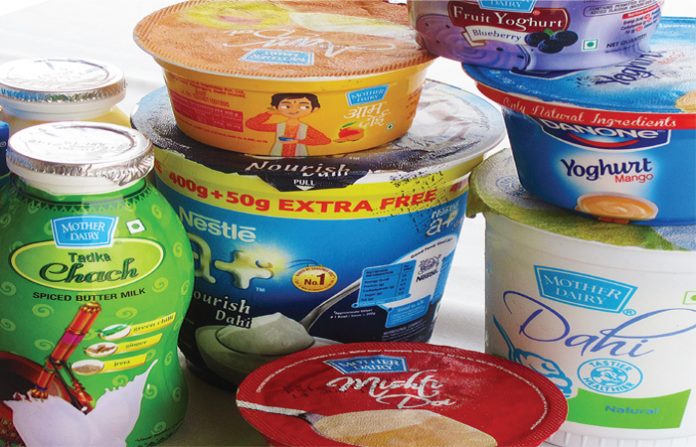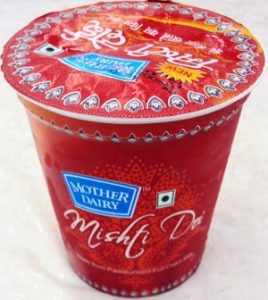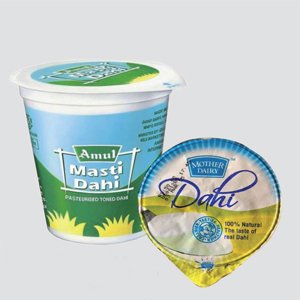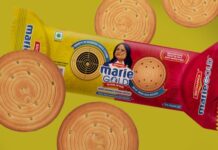
The `1,500 crore (US$ 250 million) packaged dahi (yogurt) market in India is growing at a phenomenal pace in excess of 20% year on year. Though Mother Dairy with 50,000 outlets and Amul Dairy with 75,000 outlets across North and Western India are the market leaders north of the Vindhyas, there are many large regional players in the market particularly in
South India where dahi consumption is the highest and private sector dairies like Hatsun Agro, Tirumala (Lactalis), Dodla Heritage and D’Electa Foods rule the roost.
Dahi in thermoform and polypropylene cups
Packaging South Asia conducted a retail audit of dahi in the Delhi market where Mother Dairy with over 30% market share is the dominant brand competing with Amul, Nestle,
Britannia, Danone, Paras Agro, Ananda and several other dairies in a constantly expanding market space. The market leader also has the maximum variations with white curd or dahi in three sizes packed in thermoform cups with 12 to 15 days shelf-life generating the maximum sales in Delhi. All dahi sold in large retail stores is licensed as specified by the Food Safety and Standards Act, FSSA 2011, which covers every dairy product from Indian dairies whose output is more than 50,000 litres a day.
Mother Dairy dahi produced from toned low fat milk comes in thermoform cups in packing sizes of 400 grams (`48), 200 grams (`25) and 85 grams (`10) sold both at its own retail outlets and in third party stores. Mishti doi, a popular sweet curd version aimed at the high-end market, is made from whole cream milk. It is distributed in thermoform packings
of 400 grams (`55) and 200 grams (`30). Yet another high-end product is Mother Dairy’s probiotic dahi in thermoform cups priced at `50 for a 400 gm cup. While dahi in a pouch is a more popular version on an all-India level, dahi in 400 gram cups is where the maximum action is in Delhi. Retailer Sudha Gupta says this is followed by the 400 gram pouch, with all major brands in play.

cream milk
Amul’s Masti Dahi in the 400 gram polypropylene cup is priced at `55 while its 200 gram cup is priced at `30. The shelf-life of Amul’s Masti Dahi in the PP cup is 15 days. Amul’s high-end product is its probiotic offering branded as Amul ProLife available in 400 grams in a PP cup and priced at `60.
Most other top brands are available in Delhi only in the 400 gram thermoform cup packs because of this is where there is a fierce price competition. The smaller packing sizes are dominated by Mother Dairy alone. The erstwhile partners and now rivals Danone and Britannia produce competing products in this category. Danone Dahi in a 400 gram pack is available at `55 while Britannia Daily Fresh is a dahi sold in a 400 gram thermoform cup retailing this summer at `50 after `5 discount. Nestle a+ Nourish dahi is priced at `55 but is sold in a marginally bigger thermoform cup with 50 grams extra and has made inroads in the highend urban market. Volumes are very high in the 400 gram segment and most stocks sell out by the end of day according to retailers.
A variety of packaging for dahi, lassi, yogurt, raita
In the milk products arena in Delhi, the war is between Amul and Mother Dairy although they have clearly defined territories. Together they have more than a hundred variations in the market with butter, ice cream and dahi being the three top selling verticals. Retailers who store Amul brands do not store Mother Dairy and vice versa – not because the shops don’t want to but because the suppliers want to avoid an all out price war of a few years ago that has seen a truce of late. Third party retailers prefer Mother Dairy dahi because it is the most popular and competitive brand in Delhi with over 30% market share.

The Mother Dairy 400 gram dahi flexible pouch is priced at `28 while those of Amul Masti, Danone and Nestle are priced `30. The shelf-life of the dahi pouches are 10 days. The low price of the Mother Dairy 400 gram pouch dahi acts as a price barrier and restricts the sale of higher priced 200 gram dahi cups of competing brands.
Dahi in traditional earthen matkis is still available in Delhi in local pockets. The Ananda Matki Dahi in a colorful plastic pot looking like the traditional matki has also made a strong entry with the 500 gram matki selling at `42. Apart from pouches and plastic pots there is flavoured lassi sold in standard, strawberry and mango flavours in polypropylene bottles with 200 gram lassi priced at `18 and the 100 gram Nutrifit strawberry lassi priced at `10.
Flavoured yogurt has also made its way to the upper end stores after several unsuccessful attempts and you can see strawberry and raspberry flavoured Mother Dairy fruit yoghurt in 100 gram cups. Nestle’s jeera raita in 400 gram pouches is also a popular variation of spiced up dahi selling at `30 in Delhi. With India’s love for spices and colors unabated, more variations of the plain dahi can be expected as the market matures.











